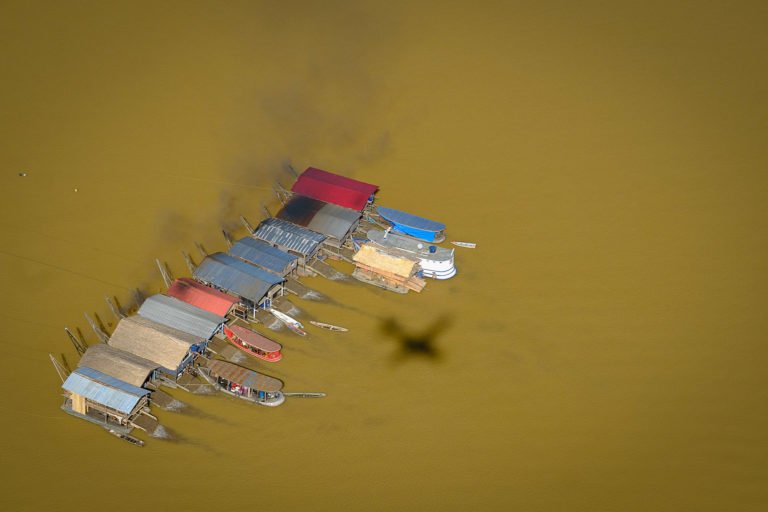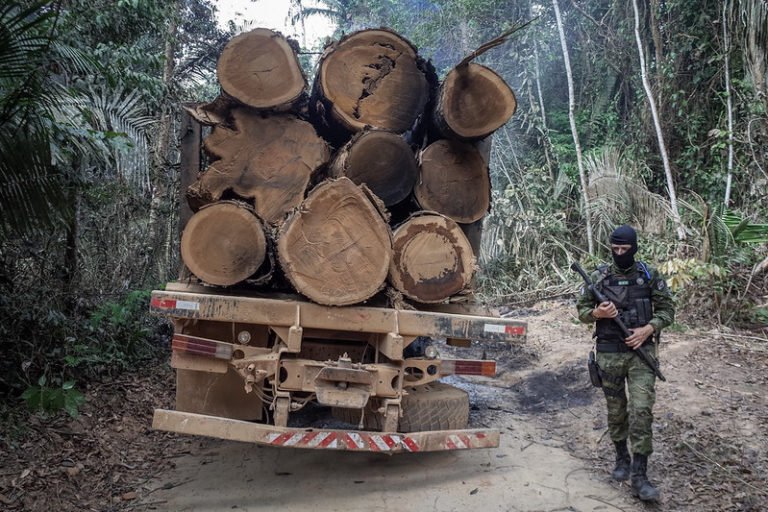- Crimes associated with illegal logging, mining and other illicit activities in the Brazilian Amazon are being felt in 24 of Brazil’s 27 states, a new report shows.
- Records of more than 300 Federal Police operations between 2016 and 2021 show that crimes such as tax evasion, money laundering, corruption and wildlife trafficking are reverberating far beyond the rainforest.
- Deforestation is at the center of the criminal economy in the Amazon, driving four main illegal activities: logging, mining, occupation of public lands, and environmental violations associated with agriculture.
- Nearly half of the police operations investigated crimes that occurred in protected areas in the Amazon, including 37 Indigenous territories.
The Brazilian Amazon covers nine of the country’s 27 states, but environmental crimes committed in the rainforest have rippled out to nearly every single state, a new analysis shows.
Activities such as illegal logging, gold mining and illegal occupation of public lands are linked directly to a range of crimes that are widespread throughout the country, according to the analysis conducted by the Igarapé Institute. These include tax evasion, money laundering, corruption, criminal association, fraud, and wildlife trafficking.
It found these crimes are present in 24 of the 27 states, with Alagoas, Paraíba and Pernambuco the only exceptions. That translates into a total of 254 Brazilian municipalities as well as eight cities in other South American countries caught up in this web of illegal businesses that contribute directly and indirectly to the degradation of the largest tropical rainforest on Earth.
The Amazonian state of Pará is the most affected by these crimes, which the analysis recorded in 161 locations within the state. This is followed by the states of Rondônia (122 locations) and Amapá (101). Outside the Amazonian region, São Paulo is the most affected state (36 locations), followed by Paraná (14) and Goiás (10).
Analyzing information generated by more than 300 Federal Police operations conducted between 2016 and 2021, researchers found that the illegal logging industry has the biggest footprint beyond the Amazon; criminal activity associated with illegal logging was found in 166 municipalities across 23 states.
Illegal mining in the Amazon also reverberates far beyond the rainforest, with associated criminal activity in 125 municipalities across 20 states. In addition to environmental crimes, illegal mining — mainly for gold — is associated with crimes such as fraud, tax evasion, and money laundering.
The data also indicated that Indigenous territories are some of the main targets of the criminal organizations operating in the Amazon from national and international networks.
The Yanomami Indigenous Territory in Roraima state had the most police operations during the period studied, mostly in response to illegal mining and logging, with 26 recorded operations. It was followed by the Munduruku Indigenous Territory in Pará and the Sete de Setembro Indigenous Territory, straddling Rondônia and Mato Gross states, with eight operations each. Investigations involving some type of violence were mapped in 19 Indigenous territories in the Amazon.

Ecosystem of environmental crimes
Melina Risso, research director at the Igarapé Institute, said the analysis is part of the research series “Mapping environmental crime in the Amazon Basin,” which in turn is part of the institute’s Climate Security Program. The idea, she said, is to look beyond Brazil’s borders to understand how the “ecosystem of environmental crimes” operates and to present recommendations to tackle these interconnections between networks and organizations.
The first report from the mapping series was released in February, and a comparative study between the countries that lie in the Amazon Basin will be next. The researchers want to further understand how financial flows are operating as drivers of illicit economic activities in the region, where the Risso pointed out that “there is a mix of legality and illegality.”
She said markets such as the gold market benefit from the absence of information that would otherwise make it possible to track the entire supply chain. “How do you dismantle a criminal organization that has a financial section operating in São Paulo?” Risso said.
Because of these and other concerns, the Igarapé Institute plans to soon launch a multidimensional security proposal for the Amazon that will contribute to integrated planning actions, considering the complexity of the region, Risso said. “There is a section of society that is interested in knowing how this debate is advancing, and the current scenario serves as a warning,” she said.
She added that part of the solution for this problem is political will. “The issue has to be at the center of the public agenda, since environmental crime is still perceived as a second-class crime by those who fail to understand its impact and scope,” Risso said.

Loosening of protections encourages crime
Antônio Eduardo Cerqueira de Oliveira, executive secretary of the Indigenist Missionary Council (CIMI), an advocacy group affiliated with the Catholic Church, said the Igarapé Institute’s report highlights an alarming scenario of violence against Indigenous peoples and their territories in the Amazon.
He said the situation has worsened due to efforts by both the executive and legislative branches of government to loosen socioenvironmental protections. “Government leaders’ speeches and the bills announced as priorities in Congress encourage the invasions of Indigenous lands that are at the mercy of armed militias,” Oliveira said.
He cited the case of PL 191/2020, a bill currently before Congress, which proposes opening up Indigenous territories to mining and other exploitation activities that run counter to the principles of safeguarding the natural and cultural heritage of Indigenous communities.
Oliveira also pointed to opinions, ordinances and instructions from Funai, the federal agency for Indigenous affairs, that have contributed to weakening the institutional framework for protecting Indigenous territories. “These peoples have remained mobilized and sought support from the courts and from national and international civil society, since the government is insensitive and not concerned with socioenvironmental issues in Brazil,” he said.
Adriana Ramos, a political and socioenvironmental law adviser at the Instituto Socioambiental (ISA), a nonprofit that advocates for the rights of Indigenous and traditional peoples, agreed that government rhetoric and hostile legislation likely contribute to the criminal activity in Indigenous territories.
She said a key point revealed in the Igarapé Institute report is the pervasiveness and persistence of the illegal logging industry in the Amazon. Ramos also emphasized the need to allocate public lands for socioenvironmental protection purposes, a strategy that, she said, “has been undermined in Congress.” But beyond establishing more protected areas, there also needs to be real effort to protect these territories, Ramos added.
She also called on financial watchdogs to consider “the presence of illegality in itself as a risk to investments,” saying that mechanisms of accountability have been weakened under the current administration.
Ramos said it’s crucial to expand support mechanisms for traditional communities who have acted in resistance to the criminal elements and aren’t responsible for the environmental crimes occurring in the Amazon. “They need support to become even stronger as guardians of nature,” she said.
Banner image of illegal timber seized in the municipality of Novo Progresso, Pará state, courtesy of Felipe-Werneck/IBAMA.
This story was reported by Mongabay’s Brazil team and first published here on our Brazil site on Aug. 18, 2022.











